Edie Melson's Blog, page 209
February 17, 2020
So You Want to Write a Book

by Lucinda Secrest McDowell @LucindaSMcDowel
I love to write. I love to speak. I love people who come up and chat with me at events.
And yes, I even love people who say to me, “I want to write a book too!”
But I’m often stymied by how to answer their inevitable questions about how I can help them get published. I have some standard answers, including urging them to attend a writers’ conference and meet industry professionals, other writers, and go to practical workshops. Mostly I tell them they need to go home and write.
Yes, even if just in journals (or a letter to their mama) for starters. You would be amazed at how many would-be-published-authors have a hard time just sitting down and doing the hard work of writing. And rewriting. And rewriting. And rewriting…
For me, writing is a joy – an extension of who I am and how I view the world. But honey, writing is also hard work. It is, as someone once said, “Writing is easy, you just open a vein and bleed…” When our books are launched into the world, our thoughts and feelings and experiences and stories are no longer just our own – we have shared them with a public who can all too often be harsh and critical with very long memories. Especially these days.
But we have also shared the deepest parts of our souls with people who are hurting, seeking, and longing to know they are not alone. To discover there is something (someone) bigger out there. People who need hope.
Those who might just lap up our words as water for a thirsty soul. That’s why it’s so important that we take the time to make sure our words are firmly founded on His words. That’s why it sometimes takes a lifetime just to live the story before we write it for others.
For those who write non-fiction and memoir sometimes there is a temptation to write down everything we know. Now that we finally have an “audience,” we want to hold onto them and subject them to every tiny incident that was important to us. What we must remember is that too much information is like drinking from a fire hydrant, and we don’t want to drown our readers – we want to offer them a lifejacket.
So, share your story, but perhaps only part of it. Pick a theme from your life – something that keeps showing up in all the seasons. Write the stories about that, bring in the biblical teaching, and make it all winsome and welcoming.
What works best is offering transferable concepts. You may have a heroic story of overcoming great tragedy and suffering. Let’s say it’s a cancer journey. Write in such a way that others – even if they are never diagnosed with cancer – can appropriate your wisdom into their own suffering situation.
I just wrote a book and it launched it out into the world yesterday! It doesn’t matter that it was my 15th published book – releasing those words was both scary and satisfying. Soul Strong is a reflection of God’s many fingerprints on my life thus far. But it’s not a very long book. Because I didn’t share everything. I did share specifically all about seven keys to a vibrant life.
I lived it. I researched. I pondered. I prayed. I reread my journals and scribblings and letters and musings. I wrote a poem and some prayers. I rewrote a lot of stuff. I took out some things and threw a bit in. I rewrote. I prayed a lot. I asked others to pre-read. I waited on pins and needles until I got their feedback. I changed some things. I rewrote. Then I submitted.
Here is my heart on a platter. It’s everything I learned after I knew it all. And yes, Soul Strong is not a thick book. But there is meat inside those covers. And lots of space for the reader to work through what I’ve presented in order to know themselves (and God) better. I love collaboration!
I hope you write a book too. Whether or not it ever gets published. Oh yeah, that’s the deal. We write in obedience to a call, with no guarantees of the outcome. That’s where trust and faith come in. Offer your life and your work up to God. Collaborate with Him on both the living and the writing of the story.
Then wait and see what happens. This is where I am today and it’s a good place to be.
TWEETABLESo You Want to Write a Book - @LucindaSMcDowel on @EdieMelson (Click to Tweet)
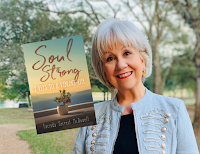 Lucinda Secrest McDowell, M.T.S., is a storyteller and seasoned mentor who engages both heart and mind while
“Helping you Choose a Life of Serenity & Strength.”
A graduate of Gordon-Conwell Theological Seminary and Furman University, McDowell is the author of 15 books and contributing author to 30+ books. Her award-winning books include
LIFE-GIVING CHOICES
,
SOUL STRONG
(2020),
DWELLING PLACES
(2017 Christian Retailing BEST Award for Devotional),
ORDINARY GRACES
(2018 Selah Finalist),
LIVE THESE WORDS
, and
Refresh!
Lucinda, a member of the REDBUD WRITERS GUILD, received Mt. Hermon “Writer of the Year” award and guest blogs for The Write Conversation, Blue Ridge Mountains Christian Writers Conference Blog and (in)courage. Whether co-directing
“RENEW ~ RETREAT FOR NEW ENGLAND WRITING,”
pouring into young mamas, or leading a restorative day of prayer, she is energized by investing in people of all ages. Lucinda’s favorites include tea parties, good books, laughing friends, ancient prayers, country music, cozy quilts, musical theatre, and especially her family scattered around the world doing amazing things. Known for her ability to convey deep truth in practical and winsome ways, she writes from “Sunnyside” cottage in New England and blogs weekly at
https://lucindasecrestmcdowell.com/
Follow Lucinda on Twitter: @LUCINDASMCDOWEL
Lucinda Secrest McDowell, M.T.S., is a storyteller and seasoned mentor who engages both heart and mind while
“Helping you Choose a Life of Serenity & Strength.”
A graduate of Gordon-Conwell Theological Seminary and Furman University, McDowell is the author of 15 books and contributing author to 30+ books. Her award-winning books include
LIFE-GIVING CHOICES
,
SOUL STRONG
(2020),
DWELLING PLACES
(2017 Christian Retailing BEST Award for Devotional),
ORDINARY GRACES
(2018 Selah Finalist),
LIVE THESE WORDS
, and
Refresh!
Lucinda, a member of the REDBUD WRITERS GUILD, received Mt. Hermon “Writer of the Year” award and guest blogs for The Write Conversation, Blue Ridge Mountains Christian Writers Conference Blog and (in)courage. Whether co-directing
“RENEW ~ RETREAT FOR NEW ENGLAND WRITING,”
pouring into young mamas, or leading a restorative day of prayer, she is energized by investing in people of all ages. Lucinda’s favorites include tea parties, good books, laughing friends, ancient prayers, country music, cozy quilts, musical theatre, and especially her family scattered around the world doing amazing things. Known for her ability to convey deep truth in practical and winsome ways, she writes from “Sunnyside” cottage in New England and blogs weekly at
https://lucindasecrestmcdowell.com/
Follow Lucinda on Twitter: @LUCINDASMCDOWEL
Published on February 17, 2020 22:00
February 16, 2020
Tips for Marketing Children’s Books
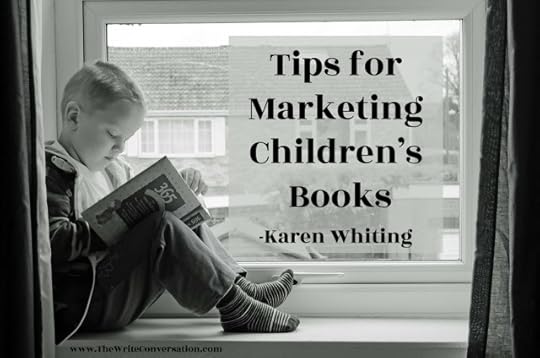
by Karen Whiting @KarenHWhiting
Parents, grandparents, and teachers are the biggest buyers of children’s books although the child is the actual audience. That means marketing simultaneously to both adults and children. The adults want great reasons to buy the book that promote education and inspire children to become lifelong readers. For children, it’s all about being entertained and excited.Pitch to Both Buyers and ReadersThe sales pitch needs to convey messages to both groups. A fiction author might write a book that offers adventure where the hero overcome bullies. The pitch would be about the heroes and plot twists with a caveat of how the heroes overcame the bullies around them. A nonfiction book author with a title about nature might pitch the fun of activities, games, and experiments while mentioning it covers sustainable farming, national parks, and energy so kids hear fun and adults hear education.
Add ValueEvery tool used must keep in mind the need to appeal to both the adult and the child. That includes the back cover and bookmarks as well. One side of the bookmark can promote the title, ISBN, and value, while the other side can communicate the fun and adventure of the book.
Added value of free activities entices a teacher or parent to buy the book and excites a child. That can be links to lesson plans, lapbooks, craft ideas with patterns and directions, and games to make and play. Any little tool that reinforces the concepts of the book helps the book standout. Any activity that involves fun makes it an adventure for the child. Activities such as puppet patterns with a script let children discover fun while parents view it as a learning reinforcement tool.
Reach the Kid AudienceLibrary and school visits provide great ways to reach the reading audience, as do homeschool conventions and specific trade shows such as Renaissance Fairs for fantasy authors. Be sure you can grab a child’s interest fast if you’ll be speaking to a group.
I open a talk at schools with an article I wrote by stating this is a true story and reading, “I opened my mouth to yell for help, but blood gushed out instead of words.” After the shivers and exclamations the children stare at me and remain quiet as I continue speaking. They laugh and respond to the story as we continue. I weave in the education of the elements of a good story while finishing the tale.
Let the teacher or event planner know what you’ll present and list the benefits. Share what you need including flyers or information to send home ahead for children to order books. Ask for references when you finish to help promote future events.
Use Social MediaYou’ll reach the adult buyers more than children with social media. Provide something to pass on to the child, such as a free downloadable coloring page, puzzle, or other activity. A video clip of reading some of the book and chatting about it can be a shareable message the parent shows the child to grab the interest of both
Glimpses of the illustrations, the reason behind the book, and author’s passion can engage the parent. Create a storyboard that shares some of the highlights of the book to create a great PIN. Add images of the cover, back cover, and bookmarks. These can be done for a variety of social media outlets. Always remember to add your website link to make it easy for followers to buy.
Prepare for Bulk SalesBe ready to sell a multiple copies to a group such as a scout troop, class, homeschool group, or a full selection of your books to a library, including homeschool libraries. These buyers want a discount for larger purchases, and will return for future releases.
Selling children’s books is about connecting with the young readers and the adults who buy for them. Make it fun and everyone will have a blast, buy books, and gain from your words.
TWEETABLE
Tips for Marketing Children’s Books - @KarenHWhiting on @EdieMelson (Click to Tweet)
 Karen Whiting (www.karenwhiting.com) is an international speaker, former television host of Puppets on Parade, certified writing and marketing coach, and award-winning author of twenty-six books for women, children, and families. Her newest book, 52 Weekly Devotions for Families Called to Serve, uses stories, activities, and chat prompts to help families develop servant hearts and foster strong bonds in families who have members serving the community, nation, or world.
Karen Whiting (www.karenwhiting.com) is an international speaker, former television host of Puppets on Parade, certified writing and marketing coach, and award-winning author of twenty-six books for women, children, and families. Her newest book, 52 Weekly Devotions for Families Called to Serve, uses stories, activities, and chat prompts to help families develop servant hearts and foster strong bonds in families who have members serving the community, nation, or world.She has a heart to grow tomorrow’s wholesome families today. She has written more than seven hundred articles for more than sixty publications and loves to let creativity splash over the pages of what she writes. She writes for Leading Hearts and Crosswalk.com. Connect with Karen on Twitter @KarenHWhiting, Pinterest KarenWhiting, and FB KarenHWhiting
Published on February 16, 2020 22:00
February 15, 2020
We Should Be Writing

by Tammy Karasek @TickledPinkTam
Have you ever found yourself with looming writing deadlines and nary a paragraph completed on a page? Whether those deadlines are self-imposed or set by someone else, they seem to nag and agitate you until you get that piece done. Or worse, you panic and freeze.We sit down to write but can’t think about what we want to say. Why can’t we get started? It’s not fair that the words flood our minds while in the shower or when we’re in a car in super busy traffic.
Why won’t the words come when needed? I think it’s because the writing I feel we’re called to do, is what the Lord wants us to share. Which means that satan isn’t happy with that and will put major distractions in our paths every chance he gets. Unfortunately, he often succeeds.
So, what is a poor writer to do? No, seriously—I am asking you.
Below is a list of some of the ways I’m trying to overcome those times I’ve sat staring at the blinking cursor. I hope they might help you.
7 Ways I Keep Myself Writing
1) I have one calendar that I log all my writing jobs down and on what days they are due. Having them written down, I can see at a glance what pieces are coming up and if I’ve already made a note or two about a thought I had for that item.
2) I created an Excel log sheet I use for pertinent information I have on the piece such as: title, date due, date I sent, where to send and guidelines for the piece. I can look over topics I’ve already written and often another idea comes to mind based on a previous article.
3) I look ahead a couple of weeks to see what’s coming. Not only for the pieces I’m writing, but also what is scheduled outside of writing. Maybe something will be due during a very heavily scheduled week, so I might want to get a start on that. Of course, we all need those margins of time built into each day for the “other” parts of life that could happen!
4) I carry a small tablet that is easy to write in at the red light or I will use my voice memo on my iPhone. Now that I’m staring at the blasted-blinking cursor, I pull out my notes and transfer to the top of the page to get me started. Carry on what I started the other day.
5) I set aside time everyday to open up a Word document and type what’s on my mind about my WIP (work-in-progress). It could be a scene idea or something I thought of that I want to go back and change, but I empty my mind so the muse can begin to roll. Sometimes it might be another story mulling around in my head that won’t leave me alone. I’ll type all the thoughts, then I file it away until I need to retrieve it later.
6) I now use a cute kitchen timer to challenge myself with word sprints. I write down a word count number, set the timer for twenty minutes and take off writing unedited writing. Think NaNo writing. It might be 400 words of mush, but when you edit, you might find some great golden nuggets to add to your WIP. Also, this little timer has been helpful for setting a time limit for surfing Social Media, too. Just sayin’… Maybe I’m the only one with that issue.
7) I’m grateful for my writing partners who have been valuable to hold me accountable to keep at it. To know they will ask is often the incentive I need to push through.
I won’t like to you and tell you I have mastered any of the six items above, but I am getting closer to a solid routine that works for me. I do like to read what works for other writers and I often give them a try for myself. I encourage you to seek what will get you into that funky, cool writing groove that is uniquely yours.
But remember, if you have come up with a great idea or two, we’d love for you to share with the rest of us!
TWEETABLE
We Should Be Writing - encouragement from @TickledPinkTam on @EdieMelson (Click to Tweet)
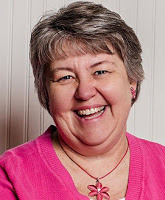 You’ll find Tammy seeing humor and causing laughter in every aspect of life. Her past, filled with bullying and criticism from family, is the driving force of her passion to always encourage others and give them The Reason to smile. She’s been married to her college sweetheart, Larry, for 37 years, a mom to their grown daughter, Kristen, and wrapped around the paw of a little dog named Hattie. Born and raised in Ohio, her family now resides in South Carolina. She is the President of Word Weavers Upstate SC, member of ACFW and My Book Therapy/Novel Academy. She’s the Blog Editor for Word Weavers International. A Conference Assistant for Blue Ridge Christian Writers Conference. A monthly contributor for The Write Conversation. A contributor in the 2018 Divine Moments Compilation Book—Cool-inary Moments. Also a regular contributor to several other blogs.
You’ll find Tammy seeing humor and causing laughter in every aspect of life. Her past, filled with bullying and criticism from family, is the driving force of her passion to always encourage others and give them The Reason to smile. She’s been married to her college sweetheart, Larry, for 37 years, a mom to their grown daughter, Kristen, and wrapped around the paw of a little dog named Hattie. Born and raised in Ohio, her family now resides in South Carolina. She is the President of Word Weavers Upstate SC, member of ACFW and My Book Therapy/Novel Academy. She’s the Blog Editor for Word Weavers International. A Conference Assistant for Blue Ridge Christian Writers Conference. A monthly contributor for The Write Conversation. A contributor in the 2018 Divine Moments Compilation Book—Cool-inary Moments. Also a regular contributor to several other blogs. Connect with Tammy: Blog: http://www.tammykarasek.com Email: tickledpinktammy@gmail.com
Published on February 15, 2020 22:00
February 14, 2020
15 Things to Love About Being a Writer
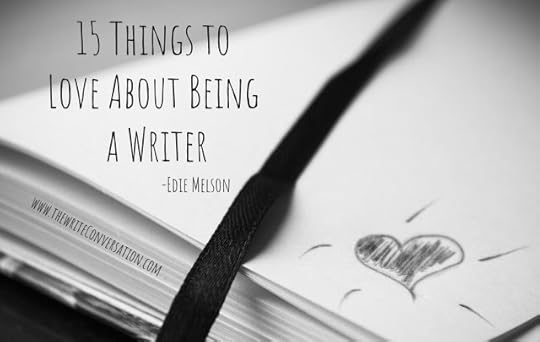
by Edie Melson @EdieMelson
We all know there are aspects of choosing to write for a living that can make life tough. It’s easy to get focused on just the negatives. Today I want us to celebrate the best parts of being a writer!
15 Things to Love About Being a Writer
1. We get to use our own experiences—good and bad—to impact others. I’ve learned that we all share a lot of the same fears, hopes and struggles. Writing gives me a chance to share what I’ve been through and watch it impact others.
2. We hear voices in our heads and it’s completely normal. Not only is it normal, but it’s downright scary when our imaginary friends stop talking to us
3. I can buy books and write it off. Books are some of my favorite things in the whole world. Now I need to buy them to further my career.
4. We can take revenge on those who irritate us. Of course we don’t make them recognizable, but it makes us feel better when we can expose their actions in our books. After all, there’s a reason for that old saying, the pen is mightier than the sword.
5. We get to work in our pajamas. Or at least in comfy clothes. There’s something to be said for working at home where we don’t have to worry about how we look.
6. I get to be the boss. I’m a total control freak, so being in charge fits my personality perfectly. I’m in charge of me, my schedule (to a certain degree) and I get to tell my characters what to do.
7. We get to be friends with other writers – and some of them are famous. Some of my first heroes were authors. Now, I’m friends with other writers and get to hang out with the people I’ve always admired.
8. We get to research anything we want. I like to think of it as a healthy curiosity. I refuse to accept my husband’s description of me as nosey.
9. We get to hang out in coffee shops and libraries. I love the atmosphere of coffee shops and libraries. As a writer, I have a legitimate reason for hanging out there.
10. I get to buy pens and paper. Again, these are some of my favorite things. But since I earn my living as a writer, I have to have them for my business.
11. We get paid to make things up. No, not when we’re writing articles and things like that. But for those of us who write fiction, we get to create everything from our imagination.
12. We get fan mail. It’s not the fan mail exactly that’s the best. For me it’s hearing from someone I don’t know that has been touched by the words I wrote. I love getting to see glimpses of God working through me.
13. I get to be weird. Writers look at the world a little differently. We can embrace that because people expect it. No need to hide behind a mask of normalcy.
14. All those hours of daydreaming are legitimate work time. Even if we write nonfiction, we still have to come up with new and different ways to present the information. That means time spent thinking and dreaming is a workday requirement.
15. We are courageous enough to follow our dreams. We talk a lot about the fears that come with being a writer. It’s important to never forget the courage it takes to following our dreams. That's something we should celebrate!
These are my 15 favorite things about being a writer. What’s your favorite thing? Be sure to leave your thoughts in the comments section below.
Don’t forget to join the conversation!Blessings,
Edie
TWEETABLE
15 Things to Love About Being a Writer - @EdieMelson (Click to Tweet)
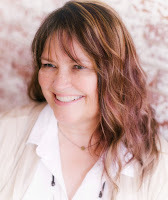 Edie Melson is a woman of faith with ink-stained fingers observing life through the lens of her camera. No matter whether she’s talking to writers, entrepreneurs, or readers, her first advice is always “Find your voice, live your story.” As an author, blogger, and speaker she’s encouraged and challenged audiences across the country and around the world. Her numerous books reflect her passion to help others develop the strength of their God-given gifts and apply them to their lives. Connect with her on her website, through Facebook, Twitter and Instagram.
Edie Melson is a woman of faith with ink-stained fingers observing life through the lens of her camera. No matter whether she’s talking to writers, entrepreneurs, or readers, her first advice is always “Find your voice, live your story.” As an author, blogger, and speaker she’s encouraged and challenged audiences across the country and around the world. Her numerous books reflect her passion to help others develop the strength of their God-given gifts and apply them to their lives. Connect with her on her website, through Facebook, Twitter and Instagram.
Published on February 14, 2020 22:00
February 13, 2020
Two Words Christian Writers Should Stop Using
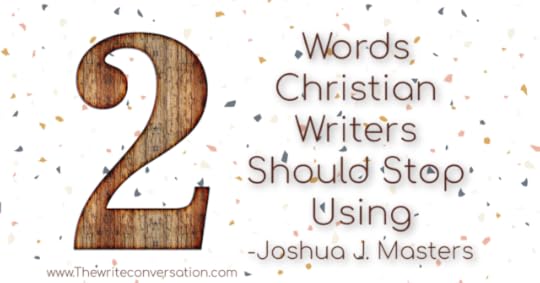
by Joshua J. Masters @JoshuaJMasters
As Christian writers, we know the importance of selecting just the right words. But many of us over use two words that stunt our growth as writers and followers of Christ—two words we should remove from our vocabulary. Those words are have to.Most of the time we say, “I have to,” we should actually say, “I get to…” or “I choose to...”
If we’re honest, there aren’t that many true have to situations in our lives. Using that phrase reveals our attitude toward our writing, our relationships, and the circumstances of our lives.
I GET TO…
The blessings we count as burdens in our writing life are not have to moments, they’re our get to moments. Remembering that is a great way to change our attitude, which leads to deeper personal contentment and a more fulfilling career as a writer.
Yes, sometimes the good things in our lives can be inconvenient, but we should avoid using the words “I have to” or the so-called inconvenient will transform into bitterness. Instead, we should use the words “I get to.”
“I get to work on the book God has given me.” “I get to edit the first chapter God gave me.”“I get to prepare for that writing conference God is allowing me to go experience.”“I get to read my Bible and build my relationship with God.” “I get to see my child play the actual rock in their annual Plymouth Rock pageant.”
See the difference? When we perceive our blessings as obligations, we stop being thankful. That impacts our spiritual growth and our writing, but when we reframe our words to reflect a heart of gratitude, our chores feel more like a life purpose.
I CHOOSE TO…
There’s another way we misuse those two forbidden words. We use them to cover the unhealthy (or at the very least, unproductive) choices we make, the things that impede our writing career and threaten our relationships. Those moments are rarely I have to decisions either. They’re I choose to decisions.
We prefer to say, “I have to,” because it justifies our behavior. We can feel better about a lack of productivity if we frame it as a cosmic happenstance rather than our own choices, but most of the time we’re misleading ourselves.
It’s not, “I have to watch Grey’s Anatomy and then I’ll get to my writing.”It’s, “I choose to watch Grey’s Anatomy instead of writing.”
It’s not, “I have to go out with my friends. I’ll edit this weekend.”It’s, “I’m choosing to go out with my friends. The editing can wait.”
It’s not, “I have to hit my word count. I don’t have time to read the Bible and pray today.”It’s, “I’m choosing to make my writing a bigger priority than my quiet time with God.”
Some of those choices may be appropriate occasionally, but be honest about them. Don’t trick yourself into believing you’re at the mercy of circumstance when you’re really making a choice.
I HAVE TO…
There are real have to circumstances in our lives, and we should honor them. When the phone rings in the middle of the night and you rush to the ICU because there’s been an accident, that’s a have to situation. But don’t minimize those moments by applying the words to something trivial like watching a television drama.
Saying the words, “I have to,” is usually a crutch. We use them to undermine the blessings in our lives and avoid taking responsibility for our less-than-healthy decisions.
But if we want to grow in Christ, live a life of joy, and find meaning in the gift He’s given us to write, we must embrace our blessings and take responsibility for our choices.
If God called you to be a writer, He wants to do incredible things in your life. He wants to reveal His encouraging truth in and through you. We partner best with God when we’re willing to be as truthful as possible in that relationship too.
Stop saying, “I have to,” when you should use the more honest, “I get to,” or “I choose to.”
Then watch how God transforms both your perspective and your writing.
TWEETABLETwo Words Christian Writers Should Stop Using - @JoshuaJMasters on @EdieMelson (Click to Tweet)
 Joshua J. Masters is a pastor, author, and speaker. He’s been featured on CBN Television, HIS Radio, and the Light Radio Network. Josh is the author of American Psalms: Prayers for the Christian Patriot and is a contributing author for Feed Your Soul, Refresh Bible Study Magazine, and One Christian Voice. Josh has also worked as an actor and crew member in the film industry (SAG/AFTRA) and continues to have a passion for film. He lives with his wife, Gina, and Franklin the Pup outside Greenville, South Carolina where he serves as a speaking and care pastor.
Joshua J. Masters is a pastor, author, and speaker. He’s been featured on CBN Television, HIS Radio, and the Light Radio Network. Josh is the author of American Psalms: Prayers for the Christian Patriot and is a contributing author for Feed Your Soul, Refresh Bible Study Magazine, and One Christian Voice. Josh has also worked as an actor and crew member in the film industry (SAG/AFTRA) and continues to have a passion for film. He lives with his wife, Gina, and Franklin the Pup outside Greenville, South Carolina where he serves as a speaking and care pastor.Josh would love to connect with you on his website, www.joshuajmasters.com or engage with you on Facebook, Twitter, Instagram, or Goodreads.
Published on February 13, 2020 22:00
February 12, 2020
Writers on Repeat: Don’t give up!
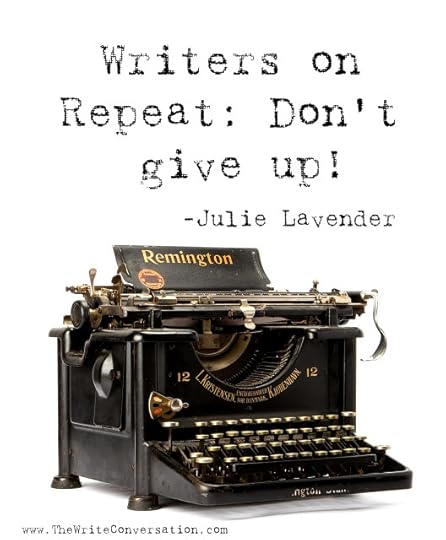
by Julie Lavender @JLavenderWrites
Bill Murray’s classic romantic comedy, Groundhog Day, played in the background (as an alternative to the Super Bowl) on one of those movie channels when I sat down to ponder my February post for The Write Conversation. With conference season on my mind, I couldn’t help but compare the lessons learned by meteorologist Phil Connors with some of my takeaways of conferencing. Be nice to othersBill Murray, as Phil Connors, learns that the best way for him to achieve greatness is to befriend and help others. A writing conference is a great place to meet fellow comrades on similar writing journeys. And, sometimes, not-so-similar. As in, a completely different genre than you’re familiar with and leaning towards, but a compatriot, nonetheless.
Attendees and faculty go the extra mile to treat others with kindness and to share the knowledge they’ve gleaned thus far on their writing trek. In a variety of stages of published and almost-published, conferees delight in sharing tips and techniques and story plots and industry jargon and prayer requests and so much more.
To achieve greatness in the writing world is to befriend and help others, to stand shoulder to shoulder with writers in the trenches. To link arms, share fellowship, and encourage with words and deeds. Whatever conference or conferences you plan to attend this season, make it a goal to “take home” a host of new friendships and lots of renewed ones, too.
Make the most of your timeThe meteorologist stuck in Groundhog Day-repeat learned to make the most of every day, with an introduction to piano lessons, ice sculpting, and a new language. Conferences offer a plethora of classes and workshops. Take advantage of the wisdom of experienced instructors by sitting in as many classes as your brain can handle and purchase recordings of other classes. And, by all means, if you need “me” time to survive, do so, but don’t miss out on the valuable information available to you around practically every corner.
Keep trying new things to get the job doneThough Murray’s character mostly wanted to break free from another Groundhog Day, he also wanted to “get the girl.” He continued to try new things to accomplish his goal. Repeat conferees know that what you learn one year and put into action may be completely different the next year. Heed the advice of those in the know. Follow suggestions and instructions of experienced faculty, because they have your best interest at heart. They want you to succeed.
I learned that lesson personally with a manuscript proposal I shared with Vicki Crumpton, Revell editor, four years ago for the first time at Blue Ridge Mountains Christian Writers Conference. I mentioned to her that I’d spoken earlier that day with Cyle Young, Hartline Literary Agency, and she said if I signed with him, to have him send it to her. She also made some suggestions for changes to my non-fiction book idea.
I did eventually sign with Cyle Young, a month or so after the conference, and I made the changes she suggested and worked on getting more active on several social media sites and starting a blog, as she also suggested.
The next year at Blue Ridge, I spoke with Vicki again, sharing the work I’d done, at her request. She made other suggestions – secure more social media followers, as well as a more regular, interactive presence on several sites. And we talked about “borrowed platform.”
Last year at the Florida Christian Writers Conference, the third time I sat down with Vicki Crumpton at a one-on-one session, I showed her the numbers of followers for two of the three homeschooling sites that I blog for monthly – the “borrowed platform” she suggested – and she said those marvelous words every writer wants to hear, “Tell Cyle to send it to me again. I’d like to publish it.”
Had I not tried each of those “new” tips she suggested, I wouldn’t have accomplished the goal I set out to achieve. My book, 365 Ways to Love Your Child: Turning Little Moments into Lasting Memories, releases in October of this year. I’m thrilled, to say the least!
Don’t Give Up! Phil Connors doesn’t give up. He “gets the girl,” makes a ton of new friends, takes advantage of new opportunities, and eventually wakes up to a new, grand day! But he had to keep plugging along to get there. You can do this! You got this! Keep praying and keep on keeping on! You’ll be so glad you did!
I hope to see lots of you at conferences this season! But in the meantime, why not share something you learned about your writing journey from a new movie or an old classic!
TWEETABLEWriters on Repeat: Don’t give up! - @JLavenderWrites on @EdieMelson (Click to Tweet)
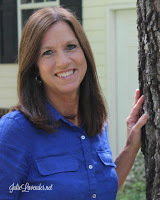 Julie Lavender – whose favorite color as a child was any shade of purple – reluctantly took off the homeschooling hat she’d worn over twenty-five years when her youngest of four started college a couple of years ago. That child is a senior, and the threat of the dreaded “empty nest” is imminent. Julie delights in filling her almost-empty nest, however, with new writing friends that she loves to connect with online or at writing conferences.
Julie Lavender – whose favorite color as a child was any shade of purple – reluctantly took off the homeschooling hat she’d worn over twenty-five years when her youngest of four started college a couple of years ago. That child is a senior, and the threat of the dreaded “empty nest” is imminent. Julie delights in filling her almost-empty nest, however, with new writing friends that she loves to connect with online or at writing conferences. Her newest book, 365 Ways to Love Your Child, published by Revell, releases in the fall. Julie co-authored two devotionals in the last six months with Michelle Cox, best-selling author of the When God Calls the Heart devotional books, inspired by the Hallmark series “When Calls the Heart.”
Julie won a Guideposts Writing Contest in 2014, joining eleven other winners in Rye, New York to study under top, New York-based Guideposts editors. One of those fellow winners just happened to be the amazing Edie Melson! Since winning that contest, Julie has been chosen for six Guideposts Refresher Workshops and been published in all four of their major publications, as well as online. Additionally, Julie writes for her hometown newspaper, the Statesboro Herald, contributing over 800 faith-based and local feature articles, a monthly family column, and a monthly women’s feature.
She is the author of 365 Days of Celebration and Praise and Creative Sleepovers for Kids and three teacher resource books for the religious division of Carson-Dellosa Publishers. She also contributes to compilations like Chicken Soup for the Soul, Heart Reno, Short and Sweet, and Guideposts collections. Julie’s magazine credits include Clubhouse, Today’s Christian Woman, Refresh, Homeschooling Today, The Upper Room, Secret Place, Southern Writers, BookFun, Focus on the Family, Mature Living, Country Woman, ParentLife, and Taste of Home.Julie and husband David have two sons, two daughters, one son-in-love, and one precious grandson. Julie has a Masters Degree in Early Childhood Education and taught public school before becoming a stay-at-home mom and homeschooling mommy. Julie and her husband, a former entomologist for the United States Navy and a current wildlife biologist at an army base, traveled about the country with their four children as Uncle Sam directed for twenty years before returning to their hometown of Statesboro, Georgia.
Connect with Julie on Facebook, Twitter at @JLavenderwrites, Instagram at JulieLavenderwrites, and follow her nature blog, On My Walk With God, at julielavender.blogspot.com
Published on February 12, 2020 22:00
February 11, 2020
Carolina Christian Writers Conference

by Linda Gilden @LindaGilden
I hope by now you have taken time to set some new goals for your writing for 2020 and figured out what you’d like to accomplish. When we assess our writing goals, we need to take a look at markets, article and book deadlines, and creative ways to sell our work. But don’t forget education. Writers need to continue to grow and learn more of the craft of writing. One of the best ways to do that is by attending conferences. In 2020 there are many great choices—Asheville Christian Writers Conference, Carolina Christian Writers Conference, Blue Ridge Mountains Christian Writers Conference, and many, many more.
If you are serious about your writing (or thinking about getting serious) I would like to personally invite you to the Carolina Christian Writers Conference. This conference takes place at the Hangar (youth building), First Baptist Church, Spartanburg, SC, March 27-28 and this year the faculty and staff are the best yet. (I know I say that every year but I really mean it!)
Every year as I assemble the faculty, I look for folks in the publishing industry who I know will encourage our writers. Whether a brand new writer or a veteran writer, I am sure you are anxious to take your writing to the next step. We would like to help you do that.
Courtney Johnson and Kelli Wolfe will will be leading our worship accompanied by Teresa Holliday. They are professional in every way and never fail to lead us in a meaningful time of worship.
If you have ever wanted to write fiction, now is the time to learn from the masters. Lynette Eason, Edie Melson, Misty Beller, Larry Leech, Sally Apokedak, and Craig von Buseck will be there to share their expertise in that and other areas.
Rhonda Robinson will lead an early bird class Friday morning. “Gathering Your Tribe: How to Grow an Email List from Zero to 1,000” is an optional class (there is a small additional charge) but gives you two and a half hours of intense training as you prepare to market your work. This hands-on class will show you how to rapidly build an email list that connects with your readers. An email list is your direct contact people who want to hear from you. In this step-by-step class Rhonda will take you through every stage of the process, from setting up your email, creating content, and strategy, to cultivating a tribe of readers eagerly awaiting your next book. This is an invaluable time and will take you quickly to the next step in your book publicity and platform building. Don’t miss it!
Also available on Friday morning at 11 o’clock is a “Welcome to the Conference” orientation. This is particularly if this is your first conference. There is no charge for this workshop.
Other faculty members include Edna Ellison, Jimmie Davis, Jayme Hull, Michelle Cox, Nancy Lohr, Rhonda Robinson, Les Stobbe, Dalene Parker, Tammy Karasek, Karen and George Porter, Gerry Wakeland, Molly Jo Really, Beth Fortune, and Beth Patch. All bring different areas of expertise to the table and are anxious to meet with you and help you grow in your writing.
Lori Hatcher is our conference chaplain this year and she and her team would love to pray for you and with you. She and her team members will be wearing a button that says “How may I pray for you.”
Many publishers will be represented. All are eager to consider your work for their publications or give you direction as to where might be a suitable, prospective market. Meetings with the professionals to pitch your work are included in your tuition as is Saturday lunch. Lots of opportunities will be present for spending time with the faculty. Manuscript critiques and scholarships are also available. Details are on the website.
There will also be a panel, Lightning Learning, Genre Groups and much more. We will end our time together with a special time of worship led by recording artist and author Dana Russell.
Don’t miss this opportunity to learn from the best and take your writing to the next level. Come let the professionals at the Carolina Christian Writers Conference help you progress to the next level. There is room for you and a friend. Register today!
TWEETABLE
Carolina Christian Writers Conference - @LindaGilden on @EdieMelson (Click to Tweet)
 Linda Gilden is an award-winning writer, speaker, editor, certified writing and speaking coach, and personality consultant. Linda is the author of 19 books and over 1000 magazine articles. She enjoys every meeting with editors and knowing we are all part of the same team. Linda’s favorite activity (other than eating folded potato chips) is floating in a pool with a good book surrounded by splashing grandchildren—a great source of writing material! www.lindagilden.com
Linda Gilden is an award-winning writer, speaker, editor, certified writing and speaking coach, and personality consultant. Linda is the author of 19 books and over 1000 magazine articles. She enjoys every meeting with editors and knowing we are all part of the same team. Linda’s favorite activity (other than eating folded potato chips) is floating in a pool with a good book surrounded by splashing grandchildren—a great source of writing material! www.lindagilden.com
Published on February 11, 2020 22:00
February 10, 2020
5 Tips for Social Media from an Author Who Just Wants it to Work

by Cindy K. Sproles @CindyDevoted
I’m no good at social media. I’m just an author who wants it to work. I’ve laughed with my dear friend, and social media guru, Edie Melson, that she dragged me into social media kicking and screaming. We know, as authors, social media is vitally important.In 2017 my first novel released—a novel of the hard life of Mercy Roller living in the backcountry of the Appalachian Mountains during the 1800s. The question was how to pull this book into social media without 1) waving a flag saying, “buy my book” or 2) without seeming self-promoting.
I love the culture of the mountains and as time passes, I see the knowledge of those ways slipping past. Mountain folks are friendly, and they are very innovative—which is why their culture is so valuable. When I teach at conferences folks tease me about my mountain heritage, in particular, my accent. But I think they also see a genuineness in me that is purely a mountain girl. I couldn’t imagine how I could spread the word about an Appalachian historical novel, when so few knew anything about the culture. Then it came to me. Mountain Trivia.
The first post on Facebook was simple: In the mountains, people gathered to make apple butter. What type of pot did they cook the apples in? 1) cast iron 2) copper 3) brass. That first post drew in a whopping 10 responses, but I tried again in a couple of days with a second question. Again, only about 10 responses. Was it worth it? However, I stuck with two posts a week for three weeks. None of them ranking more than 15 responses. I decided to stop. This wasn’t working on social media but to my surprise, when I stopped posting them I began to receive a flood of instant messages. “Where’s the trivia?”
I was a bit bumfuzzled (yes, an Appalachian term meaning perplexed). Folks weren’t responding on the posts, but they were reading them and finding them both humorous and insightful. They were learning the Appalachian mountain heritage in a fun way. Those posts get 100-150 responses, but if I miss sending them, I get dinged by the readers. It goes to show, likes and responses really don’t rate a lot because they aren’t true barometers of who is actually reading the posts.
The question becomes, can I see any result in book sales. I would say yes. Both Appalachian historical novels are well into the thousands of sales. I don’t spend hours digging into the sales figures, but I can see success by the royalty checks and that tells me all I need to know about sales. All this to say, I found a unique way to draw readers into the Appalachian realm without screaming buy my books or posting a photo of me and my book every other day. For every 10 trivia posts I do, I mention my book in passing, maybe once. I spend a good part of my time on social media, engaging in social not pressing sales. Rather, I shared others’ works and bragged on them. Of course, I post my own book occasionally, but the focus of social media was to be social—to look at others and develop relationships.
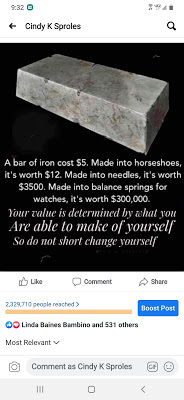 Here’s the clincher. I recently REPOSTED a photo of a block of iron with a neat quote about finding your self-worth. The post went onto my author page (which is only a couple of months old. I had no need for one until recently, when I finally hit the FB limit for friends on a personal page.) I posted that little meme on December 29. Three days later, it had reached 1000 and my followers went from 200 to 700. (Remember, this is a new Facebook author page.) One week later, the reaches on that post were 2287 and my followers had grown to 900. Less than a month from the day I posted that inspiring meme, it had reached 2,329,710 and my followers are now 1500+. (I DID NOT pay Facebook to boost the post). Who woulda thunk it?
Here’s the clincher. I recently REPOSTED a photo of a block of iron with a neat quote about finding your self-worth. The post went onto my author page (which is only a couple of months old. I had no need for one until recently, when I finally hit the FB limit for friends on a personal page.) I posted that little meme on December 29. Three days later, it had reached 1000 and my followers went from 200 to 700. (Remember, this is a new Facebook author page.) One week later, the reaches on that post were 2287 and my followers had grown to 900. Less than a month from the day I posted that inspiring meme, it had reached 2,329,710 and my followers are now 1500+. (I DID NOT pay Facebook to boost the post). Who woulda thunk it?I can’t say I understand the ins and outs of social media. The good Lord knows my patience level with learning it, is less than adequate, but I can say this about the growth of my pages. It took consistency and a genuine desire to see it grow. I share my joys, my prayer needs, trivia, and the love and joy I find in life. People appreciate it.
Here are some things from an author who just wanted things to work.
Tips to Grow Your Social Media
1. Be yourself: Don’t be something you aren’t. People can smell fake a mile away.
2. Befriend people:Pick one or two folks a week who respond on your page, and genuinely respond to theirs. This lets folks know you care about them and not just what they can do for you.
3. Avoid controversy: We live in a world that crams the chaotic moments of political craziness constantly. Anyone with a phone or a television sees the most recent political weirdness. Leave it alone on social media. Allow your posts to be a getaway from the barrage of the world’s craziness. You’ve heard the expression, “You are who you spend your time with.” Well if you spend your time with chaos, then you can call yourself, chaos’ friend and readers will move away from you.
4. Be honest with your posts: Share your heart in genuineness. If you tell someone you are praying for them, then do it.
4. Laugh at yourself:Some of my best posts are when I tell folks of my own mishaps. Readers laugh when I laugh. They learn from my adventures of what not to do in certain situations. I’ve learned to look at the joy of life and my own silliness and laugh.
Social media is a hard road, but it can be rewarding when you do it in the right way. Make the effort. You may actually change a life. Wouldn’t that be nifty?
TWEETABLE
5 Tips for #SocialMedia from an Author Who Just Wants it to Work - @CindyDevoted on @EdieMelson (Click to Tweet)
 Cindy K. Sproles is an author, speaker, and conference teacher. She is the cofounder of ChristianDevotions.us and the executive editor of ChristianDevotions.us and InspireaFire.com. Cindy is the managing editor for Straight Street Books and SonRise Devotionals, both imprints of Lighthouse Publishing of the Carolinas. She is an award-winning and best-selling author and the director of the Asheville Christian Writers Conference. Visit Cindy at
www.cindysproles.com
. @cindydevoted
Cindy K. Sproles is an author, speaker, and conference teacher. She is the cofounder of ChristianDevotions.us and the executive editor of ChristianDevotions.us and InspireaFire.com. Cindy is the managing editor for Straight Street Books and SonRise Devotionals, both imprints of Lighthouse Publishing of the Carolinas. She is an award-winning and best-selling author and the director of the Asheville Christian Writers Conference. Visit Cindy at
www.cindysproles.com
. @cindydevoted
Published on February 10, 2020 22:00
February 9, 2020
10 Things to Help You Fall Back in Love with Writing

by Edie Melson @EdieMelson
It's February—the month of love. And I want to remind us all how to stay in love with the writing life!
I’m a member of several writing groups, and I’m always amazed at the different reactions people have to similar situations. For instance, one writer might leave a critique session in tears, questioning whether or not the call to write was real. Another writer might have just as challenging a critique and leave energized because she now has the insight she needs to improve.
I’ve begun paying attention to the way the writers I respect handle this writing life. I’ve noticed that even though life gets hard at times, they never fall out of love with writing. I’m trying to take deliberate steps to guard my love of writing and not let things and/or people steal it from me. Today I’d like to share what I’ve discovered with you.
Fall Back in Love With Writing
1. Stop Being a One Way Writer. By this I mean that we’re only happy when things turn out one way. We want things a certain way and in a certain time-frame. Truthfully, it’s the writers who are flexible that stay deeply in love with the writing life.
2. Be willing to Let Go of Expectations. This one word can derail us for months, or even years, if we let it. It’s fine to make plans, but we can’t hang our hope—or our love of writing—on expectations.
3. Learning to Roll with the Punches. Hard times will come in this business. Landing a book deal and/or an agent is tough, and rarely happens quickly. When we have those two things, life can still blindside us. Contracts are cancelled, editors and agents move on without us. We’ve got to pick ourselves up and get back to writing, no matter what happens.
4. Stop Looking Backward. If we dwell on the way things used to be in publishing, we’ll always be miserable. Not because things were always better, but because we think we remember them being better. Whether they were or weren’t really isn’t the point. What we need to do is learn what we can from the past and then keep our eyes firmly forward.
5. Quit Chasing Trends. It’s tempting to tailor what we’re writing to what’s currently popular with publishers. But that’s a dead end road. There’s always something new, and it’s just not possible to pull out a crystal ball and write to what’s going to be hot when it hit the market. A wise writer gave me some advice I’ve never regretted following. “Write your passion. Don’t settle. Write what you love.” Kristen Heitzmann
6. Don't Listen to the Negative Voices. There are two types of negative voices—the ones that live in your head and the ones belonging to those around us. I believe it’s the ones inside us that are the most dangerous. For one thing, they’re much more brazen. They say things that we’d never speak out loud. But if we let others also talk us out of following our dreams, they can be dangerous too. Take constructive criticism, but don’t let the negative words bring you down.
7. Refuse to Give in to Fear. No matter how much we achieve as writers, we’re still fearful. We’re afraid of failure, of ridicule, even of success. But those writers who keep their joy are the ones who continue on in spite of the fear. They even get stronger because of the fear they overcome.
8. Reject Perfectionism. We want to strive for our very best. But we need to understand that perfection is out of our grasp. Perfectionism can keep us from submitting our work for publication, and it can even keep us from writing. Aim high and always keep learning, but be willing accept the best you can do.
9. Write Regularly. I truly believe that if our purpose in life is writing, and we don't make time to write, we'll be miserable. I know so many people who want to write, know they're called to write, and yet let everything else squeeze out the time to write. They are some of the most stressed out folks you'll ever see.
10. Don't Forget the Reason You Started Writing in the First Place. We can get so caught up in the chase, that we forget why we entered the race. For me, God made me a writer. I process life through words. When I hit hard times and good times, one of my first actions is to record it, process it, and cope with it through writing. When I return to that, no matter what else is going on, everything falls into place.
These are the ways I’ve found to make sure I never fall out of love with writing. What would you add?
Don’t forget to join the conversation!Blessings,Edie
TWEETABLE
10 Things to Help You Fall Back in Love with Writing - @EdieMelson (Click to Tweet)
Published on February 09, 2020 22:00
February 8, 2020
Learning to Thrive in the Midst of Chaos
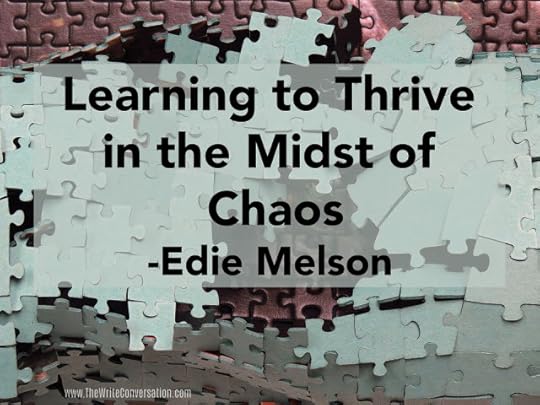
by Edie Melson @EdieMelson
I love how relevant and real the Bible is. God’s word doesn’t sugar coat life. He uses authentic—flawed—people to illustrate His truth, His forgiveness, and His grace. I can find myself in almost everyone I read about. Occasional I get it right and find myself imitating Mary. Although all too often I’m more of a Martha clone. I’m as impulsive as Peter, as much of a doubter as Thomas, and as unwilling to leave circumstances in God’s capable hands as Sarah. Some days I’m not certain living unruffled is a possibility for someone as flawed as me. Anytime life throws me a curve, I begin reacting to the busyness instead of concentrating on walking with God through the chaos.
For example, there was a trip I took to speak at a conference when several of our appliances staged a full-scale revolt. I wasn’t there, but my poor husband and three sons witnessed the carnage.
The first I heard about the disaster was through a call from my husband. He announced, via cell phone, that our refrigerator had died. Yes, he’d called the repair man before he called me—he’s a truly wise man—but all the technician could do was apply a temporary fix so I could be the one to pick out the new one once I got home. The next day hubby called again. This time the casualty was our clothes dryer, and it was beyond help.
On the last day of my conference I was leaving a class when my phone vibrated in my pocket. Sure enough, the picture on the screen promised it was my beleaguered husband. I seriously considered letting it go to voice mail, but my better nature prevailed and I worked up the fortitude to answer. Sure enough our stove and microwave—two separate appliances in our home—had joined the list of dead and dying devices.
This put me in full gotta-fix-this mode. I wasn’t worried about peace, I was deep into my to-do list.
On the flight home God and I had a discussion.
I began by pointing out to Him that while I was away from home being obedient, He could at least look after things there. I reminded Him how hard it was to concentrate on what He wanted me to do when my life was in upheaval. Surely He could orchestrate better circumstances from now on.
I know, He should have thumped me hard on the head. Instead of sending down a lightning bolt at my audacity, He pointed me back to the Bible. Specifically He sent me to study Jesus during the chaotic years of His ministry.
As I thumbed through the accounts of Jesus’ three short years of ministry I shook my head. I was reluctant to take Him as a legitimate example. After all, I explained to the Creator of the Universe, Jesus was God so He had the ability to stay calm in trying circumstances. I was flawed and weak. I needed my heavenly Father to cut me some slack.
We are never so blind as when we refuse to see.
Instead of chastising me, God sent me back to His word and to this verse, “Truly, truly, I say to you, whoever believes in me will also do the works that I do; and greater works than these will he do, because I am going to the Father.” John 14:12 (ESV).
Well ouch. Just ouch. Talk about getting my attention.
When something in the Bible troubles me, I’ve learned that instead of ignoring it or glossing over it, I need to dig deep and see what God is actually saying. So in light of what God was teaching me, I dug in and tried to make sense of something uncomfortable.
Even if I could ignore how well Jesus handled ministry in real life circumstances, I couldn’t minimize the fact that we were promised the ability to do amazing things ourselves. Not because we’re now self-sufficient—never that. Instead it was possible because we would have a helper. Jesus sent us the Holy Spirit to provide everything we needed and more.
I was out of excuses.
I recognized that I’d fallen into the trap of dismissing how Jesus did life simply because I knew He was the Son of God. I completely ignored the fact that Jesus was also fully human—struggling with weariness, stress, and the difficulties of balancing life. He faced many of the same issues we face today—difficult family situations and members, drama in His friends and followers, and a world that was hostile to His belief system. All of these are things I can relate to.
After apologizing to God and asking forgiveness, I spent the next few weeks looking at Jesus’ life. I dissected and devoured every encounter the Bible records and translating it into a pattern I could apply to my own life. I learned that I must never make the mistake of trivializing the trials He faced. Within those trials lay the keys to living in peace while chaos whirls around us
I learned 3 basic things by studying Jesus’ life in regard to conquering chaos.1. The foundational fact I discovered was how everything Jesus did flowed from the relationship He had with His Father. Just like us, He and His Father shared a yoke as He served. He didn’t try to do anything apart from God. His strength was not His own. It flowed from the power of God at work through Him.2. also observed that Jesus’ life was characterized by an ongoing conversation with God. Reading the Bible, sometimes I saw the specific communication spelled out, other times it was referred to or implied. Regardless, it was a defining hallmark of the way Jesus lived.3. Finally, I saw that He let go of His priorities and committed Himself to following God’s path, no matter how difficult seemingly crazy. He didn’t let the expectations of others dictate His actions or distract Him from the purpose of God.*Devotion used with permission from UnRuffled, Thriving in the Midst of Chaos, Bold Vision Books
TWEETABLELearning to Thrive in the Midst of Chaos - encouragement from @EdieMelson (Click to Tweet)
 Edie Melson is a woman of faith with ink-stained fingers observing life through the lens of her camera. No matter whether she’s talking to writers, entrepreneurs, or readers, her first advice is always “Find your voice, live your story.” As an author, blogger, and speaker she’s encouraged and challenged audiences across the country and around the world. Her numerous books reflect her passion to help others develop the strength of their God-given gifts and apply them to their lives. Connect with her on her website, through Facebook, Twitter and Instagram.
Edie Melson is a woman of faith with ink-stained fingers observing life through the lens of her camera. No matter whether she’s talking to writers, entrepreneurs, or readers, her first advice is always “Find your voice, live your story.” As an author, blogger, and speaker she’s encouraged and challenged audiences across the country and around the world. Her numerous books reflect her passion to help others develop the strength of their God-given gifts and apply them to their lives. Connect with her on her website, through Facebook, Twitter and Instagram.
Published on February 08, 2020 22:00



